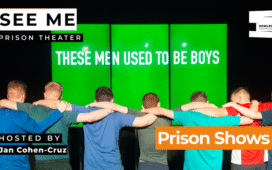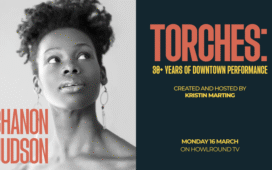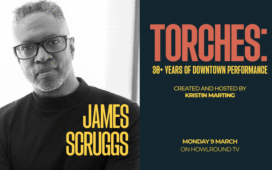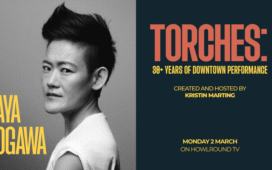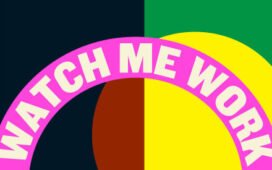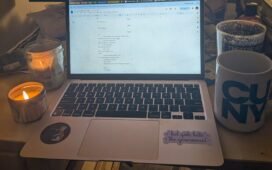Impactful, Accessible Digital Content
So many brilliant theatremakers and arts workers contributed their knowledge and expertise to our platform this year. You can see what resonated most with the community by visiting the HowlRound Recommends section on our homepage, which highlights the nine essays, TV events, and podcasts you read, viewed, and listened to the most.
I asked some of my colleagues to reflect on their own memorable experiences from 2024.
Munroe Shearer, HowlRound fellow:
Todd London’s series A Lover’s Guide to American Playwrights is almost as old as HowlRound itself, and as one grows and changes the other follows in kind. The most recent addition, “The Haunting of Migdalia Cruz,” is Todd at his most thoughtful, heartfelt, and curious. As a young playwright, names like Migdalia Cruz are easy for me to lose in a larger shuffle of iconic American plays, which only makes Todd’s love letters to their work all the more important. The series is epic, and should be required reading for the playwrights of today and tomorrow.
Back in February, I collaborated with author and theatre historian Scott Walters on an interview based on his new book: Building a Sustainable Theater: How to Remove Gatekeepers and Take Control of Your Artistic Career. We talked about the development of local audiences, decentralizing power in capitalist industries, and the rigmarole of writing effective mission statements (among other things). The interview is absolutely worth a read for Scott’s perspectives on change, and I challenge you to find yourself not reading the whole book immediately after.
Taylor Lamb, content editor:
Chantal Bilodeau’s Theatre in the Age of Climate Change series is a long-standing installment for HowlRound. As a newer addition to the team, this was my first year getting to be involved in the editorial process. It was such a gift to learn about the many theatremakers who have been creating work about the climate crisis for many years—in some cases for over a decade! In a year where we once again broke many all-time heat records, theatre about the climate emergency feels like some of the most important work we can engage in. I am so grateful to the many theatremakers who have been taking up this responsibility for a long time, and to Chantal for continuing to help amplify their work.
It was so amazing to be able to publish “We Can’t Build an Equitable Theatre While Ignoring COVID” for HowlRound. The response was incredible! Since publishing the essay, I have been able to connect with so many COVID conscious theatremakers, as well as help publish other things on the topic (like this important piece from Ezra Tozian, Claudia Alick, and Jon Jon Johnson). The response from our community was an important reminder that there is a very large portion of theatremakers who know that we are still in a pandemic, who know that the dominant approach of working as though we aren’t is unsustainable, and who are seeking to see and create work that acknowledges this reality in environments that keep us safer. I hope this essay was one small step on the road to building an equitable, accessible theatre industry that is inclusive of disabled, high-risk, and chronically ill artists and audience members.
Ashley Malafronte, senior editor:
The Twin Cities Theatres of Color Coalition and Racial Equity Funders Collaborative spent years meeting and organizing to address inequitable funding for organizations of color. When the coalition started working with research fellow kt shorb to share that valuable work publicly on HowlRound, I came on as editor and began learning about this radical experiment in funding that began not with a fundraising goal, but through deep relationship building. shorb’s two-part essay is studded with video conversations between the artistic leaders and foundation representatives who comprised this coalition, creating a piece that remained just as relationship-driven as the coalition itself.
Vijay Mathew, cultural strategist:
This was the year of the podcast for HowlRound. We had sixty-seven episodes from six shows, two of which debuted this year: Teaching Theatre and Theatre Tech Talks. The four other shows were long-time HowlRound favorites deep into multiple seasons: Daughter of Lorraine, Building Our Own Tables, From the Ground Up, and Kunafa and Shay.
Thea Rogers, TV producer:
2024 was the year that our streaming events truly came back in person—with all of the joy and technical difficulties that come with live production! I was thrilled to be back on the ground with the LTC for the tenth anniversary of the first Encuentro in Los Angeles—a convening that felt like coming home to family as we explored how much the Latinx community has built over the last decade. It’s so special to have access to these in-person spaces again, but I feel like our appreciation of the access that livestreaming provides to anyone who cannot be there—for any reason—has also continued to expand. Since I work remotely on most projects, I’m grateful to have been in the virtual room for events from New York to Vienna to Palestine this year.
HowlRound in the Classroom
This summer, we launched six new, free lesson plans for theatre educators. Created by curriculum writers Emi Aguilar and Meg Greene, they cover topics such as climate justice, activating technology, and radical accessibility, and they have already been put to use by over 175 educators.
Jamie elaborates:
As we continue to learn of the value of HowlRound as an educational resource from our community (about half of whom self-identify as theatre educators per our last community survey), we were thrilled to commission and publish more free HowlRound lesson plans on key topics for use in the classroom. If you are a theatre educator, please consider signing up for our quarterly educators digest, and let us know how you use HowlRound in your classroom and what you would like to see in the future.
At Emerson College, where we’re based, Vijay also co-taught the annual HowlRound Seminar to a class of Emerson College students. Reflecting on the course, which uses HowlRound content to consider issues facing contemporary theatre, Vijay writes:
The HowlRound Seminar unfolded during a pivotal moment, coinciding with the Gaza solidarity encampments both on our campus and around the world. Inside the classroom, students explored the transformative power of knowledge commons—learning how to shift narratives, challenge oppressive systems, and create new possibilities for justice within the theatre field and arts culture. Outside the classroom, these same students became powerful teachers, demonstrating profound values through their practice: peaceful resistance, autonomous self-organization, and a deep commitment to collective care. Their heart-centered approach to seeking liberation and demonstrating solidarity was a profound lesson that will resonate with me for years to come, and for which I am deeply grateful.
Gathering in Person and Virtually
2024 kicked off with the Under the Radar Symposium—a partnership between the Under the Radar Festival, HowlRound, the International Presenting Commons (IPC), ArKtype, and the Creative and Independent Producer Alliance (CIPA). Ashley reflects:
At the 2024 Under the Radar Symposium, theatre professionals from all around the world connected with one another to collectively envision emergent paths to strengthen the theatre industry. So many ideas and strategies surfaced during the morning keynotes and afternoon discussion forum, and when I synthesized them into a snapshot report for HowlRound, it felt like stuffing a suitcase full of glittering souvenirs to show everyone back home. I hope we were all able to find some gems packed in there.
Over the summer, the IPC partnered with the Edinburgh International Festival (EIF) for the second year in a row for an intimate conversation on the state of international exchange. Creative Producer Julia Schachnik supported and attended the event and writes:
The IPC is an emergent, evolving, volunteer group of United States–based performing arts presenters and creative independent producers that fosters international engagement with our support and collaboration. On 15 August, the IPC and EIF brought together international producers and presenters to explore the possibility of a collective future of reciprocal international exchange. The gathering opened with a sharing of real-world projects and partnerships that demonstrate mutuality and reciprocity within the context of international cultural exchange, with a focus on highlighting artists and cultural institutions or presenters with a history of working together in meaningful ways. The conversation then broadened to the wider group to uncover opportunities and challenges in the field with an eye toward moving us forward with a renewed sense of possibility and connection.
In September, we partnered with Company One Theatre to host a four-day convening of the Future of American Theatre Cohort, five intentionally multiracial organizations that envision a US theatre that aspires to be a tool for social change, serving as a catalyst for cross-cultural connection and learning. Watch the archived conversation “Public Art for Public Good: Reimagining Community Investment”on HowlRound TV.
Throughout the year, we hosted five residencies for playwrights Virginia Grise, E. M. Lewis, Carlyle Brown, J. Nicole Brooks, and Murielle Borst-Tarrant in the National Playwright Residency Program. Reflecting on a particularly exciting one, associate producer Alison Qu writes:
In May, HowlRound hosted E. M. Lewis from Artists Repertory Theatre (Portland, Oregon), who is helming a monster of a play about the ethics and beauty of science discoveries, as well as the plots and twists of Frankenstein. The play features a cast of twelve (!!). As a part of her research in Boston, E. M. Lewis kicked off her residency with an in-theatre coffee date with artificial intelligence (AI) scientists of greater Boston (famously a college and research city packed with the greatest minds) before Boston actors joined her for tablework and readings to bring alive art, science, and every love story in-between. It is both a privilege and a joy to find new intersections in the work we do, to foster support, fieldwork, and creative conversations, especially when it’s playwright-led as they dream upon the futurity of our current world.


